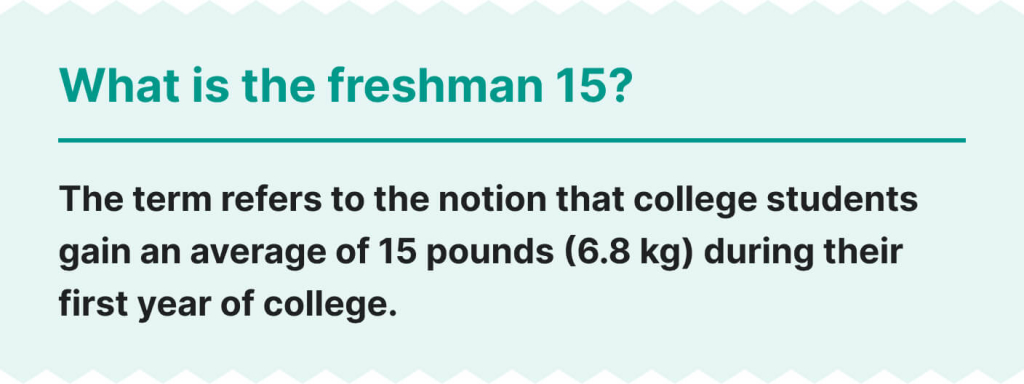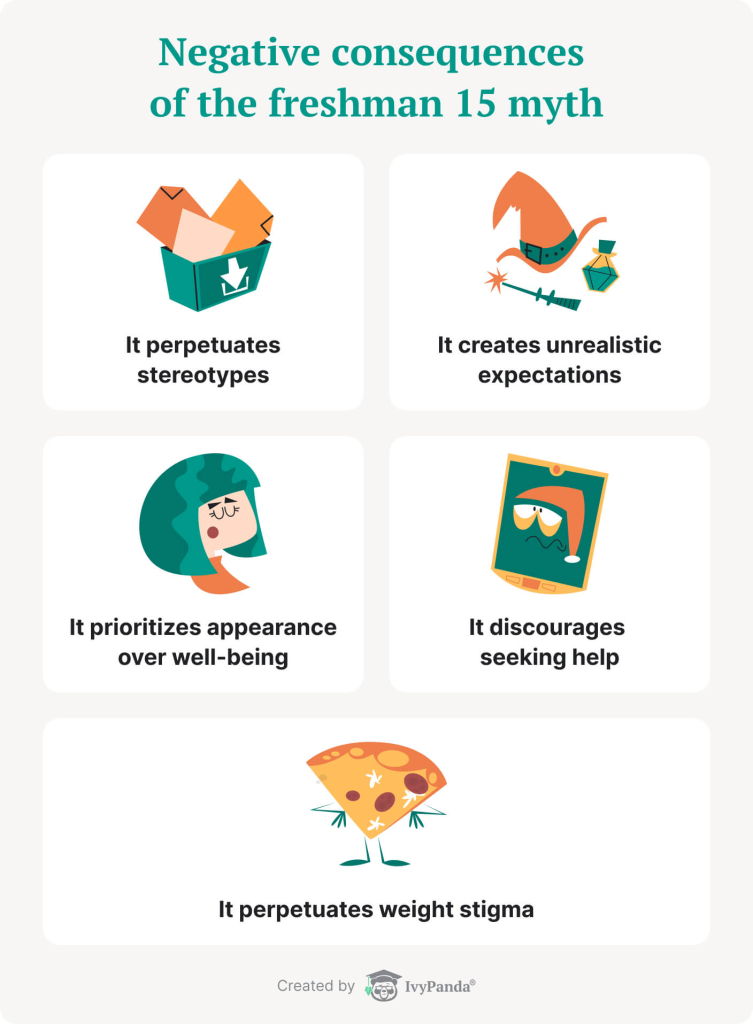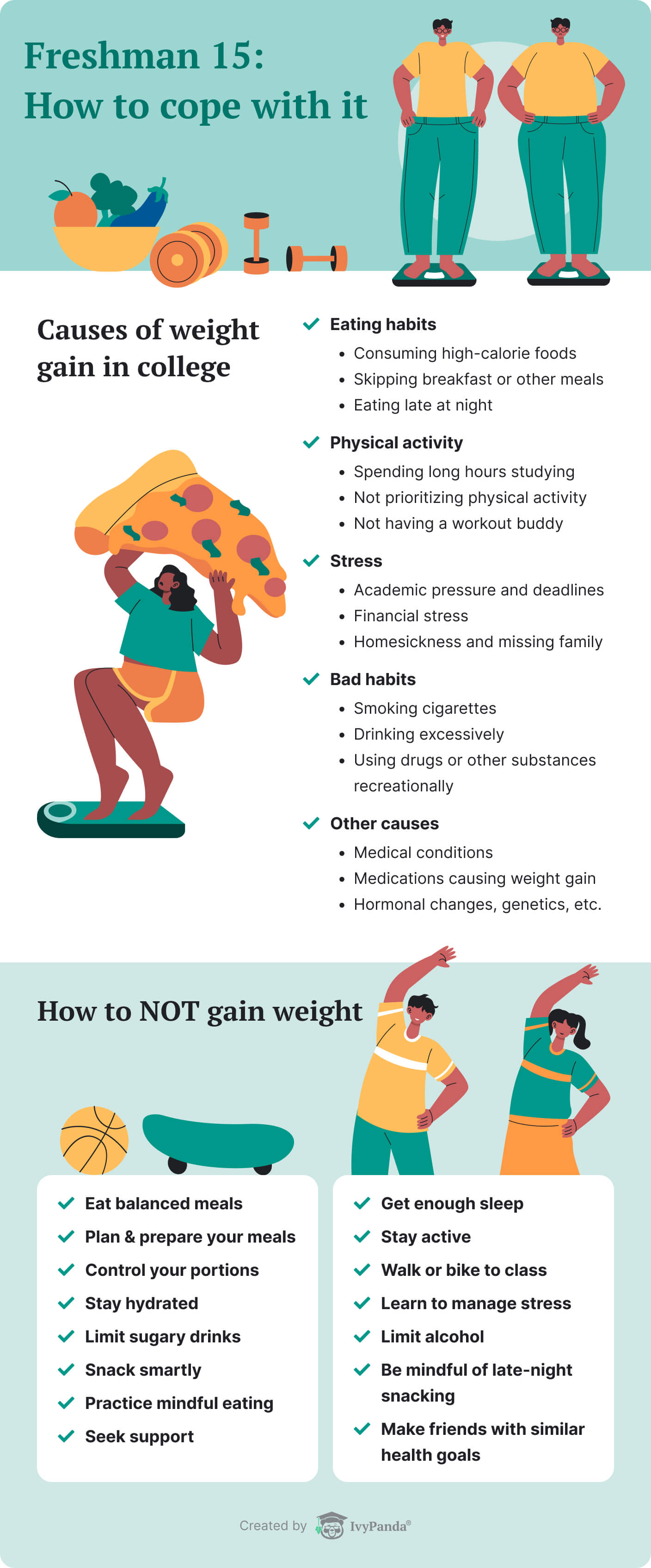Disclaimer: This article aims to debunk the Freshman 15 myth and advocate for a balanced approach to physical and mental health, not to stigmatize weight fluctuations. It is crucial to prioritize personal well-being over societal expectations of body image. If significant weight changes affect your health, we encourage you to consult a medical professional.
Did you know that according to some research, nearly half of college students gain weight in their freshman year? This trend, often cited as the “Freshman 15,” highlights the weight changes that can often happen within the transition from high school to higher education.
In this article, our team will explore the myths surrounding the Freshman 15 and provide tips for a better relationship with food and exercise.
🤔 What Is the Freshman 15?
The term “Freshman 15” talks about the notion that students attain an average of 15 pounds (6.8 kg) in the first year of study. This weight gain is often associated with factors like reduced physical activity, changes in diet, stress, and insufficient sleep.

Some believe the term came from college health specialists who found a trend of weight gain among first-year students, while others ascribe its popularity to social media. No matter the origin, “Freshman 15” is a routinely used term in the USA and Canada, referring to any weight gain college students might confront in their initial time on campus.
Why Freshman 15 Is a Myth
Everyone heading to college soon has probably heard of the infamous Freshman 15. However, many might not recognize that the idea is actually a myth.
To prove you shouldn’t stress about the Freshman 15 and to demonstrate it’s not inevitable, let’s delve into the actual scientific explorations on the topic:
- A study published in BMS found that 60.9% of students gained weight during their freshman year, with an average gain of 7.5 pounds (3.38 kg) over five months.
- An online survey performed at a private university in the northeastern United States demonstrated that, on average, freshmen gained 2.7 pounds (1.22 kg), with men gaining more than women. However, weight gain ranged substantially between individuals, with some losing weight and others gaining up to 20 pounds.
- A recent narrative review published in 2020 showed that most college students who do not follow recommended diet and lifestyle habits, on average, gain between 3.5 pounds (1.6 kg) to 6.6 pounds (3.0 kg) during their four years of college.
As you can see, the outcomes of various studies on student weight gain differ, underscoring that the Freshman 15 should not be taken as a stated truth.
🍔 Causes of Weight Gain in College
College often brings weight fluctuations due to factors like dietary changes, busy lifestyles, and heightened worry. It’s imperative to remember that gaining a few extra pounds is an intrinsic part of maturing and doesn’t define your worth.
Here are the most frequent causes of weight gain in college.
- Eating habits:
- Consuming calorie-heavy, fatty, and sugary foods.
- Skipping breakfast or other meals.
- Eating late at night.
- Binge eating or overeating.
- Relying on ready meals and fast food.
- Drinking sugar-heavy beverages such as soda and energy drinks.
- Not paying attention to portion size.
- Frequently eating out.
- Not consuming enough vitamins.
- Following fad diets or restrictive dietary patterns.
- Insufficient physical activity:
- Spending a long time in classes and studying.
- Lack of space for exercise because of academics.
- Not prioritizing physical activity.
- Lack of access to fitness spaces or equipment.
- Being too self-conscious to work out in public.
- Not having a workout buddy or support system.
- Not incorporating movement into routines (e.g., taking the stairs rathet than the elevator).
- Stress:
- Academic pressure and deadlines.
- Financial strain and concerns about loans.
- Social anxieties and worries about fitting in with classmates.
- Homesickness and missing loved ones.
- Relationship troubles or breakups.
- Feeling overwhelmed or depressed.
- Lack of time management skills leading to stress.
- Feeling isolated or lonely.
- Bad habits:
- Smoking cigarettes or tobacco products.
- Drinking large quantities of alcohol.
- Using drugs or other substances recreationally.
- Developing a habit of regular partying.
- Staying up late and not sleeping well.
- Engaging in behaviors that lead to weight gain (e.g., ordering from drive-through fast-food establishments late at night).
- Not seeking support for addiction or other difficulties.
- Other causes:
- Medical conditions such as hypothyroidism or PCOS.
- Medications with potential side effects of weight gain (e.g., birth control).
- Hormonal changes, like puberty.
- Genetics and familial history of overweight.
- Lack of education about nutrition and healthy habits.
- Trauma or emotional worries that result in disordered eating.
- Not seeking help from healthcare experts when needed.
❌ Negative Consequences of the Freshman 15 Myth
A study produced by the HSOA Journal of Community Medicine and Public Health Care revealed that 50% of the students questioned were deeply influenced by the notion of the Freshman 15. Some students may take extreme courses of action to lose weight before even stepping on campus to combat the potential gain. Their methods could include crash dieting, intense exercise, or other unhealthy weight loss tactics.
Here’s a list of concerns that highlight why the concept of Freshman 15 is problematic:
- It perpetuates stereotypes. The notion of the Freshman 15 suggests that college life inherently involves unhealthy eating habits, minimal exercise, and a sedentary routine. This narrative overlooks the varied experiences and healthy decisions made by numerous students.
- It creates unrealistic expectations. Students who enter college with the mindset of inevitable weight gain may even subconsciously adopt unhealthy behaviors or overly restrict their diets, assuming they will gain weight either way.
- It prioritizes appearance over holistic well-being. The Freshman 15 narrative centers on weight as the primary measure of health and well-being. This narrow focus overlooks other crucial aspects of a student’s overall health, such as mental wellness, stress management, and physical fitness.
- It discourages seeking help. Students who believe in the concept of the Freshman 15 may hesitate to consult healthcare professionals when facing genuine physical or mental health challenges. They may dismiss their concerns, mistakenly attributing their issues to the expected weight gain narrative.
- It perpetuates weight stigma. The notion of the Freshman 15 fosters weight-based discrimination and prejudice. It insinuates that weight gain is inherently negative or undesirable, which can contribute to weight stigma and body shaming on campus.

What can be done about it? If you observe concerning eating behaviors in a campus friend, it’s crucial to voice your concerns and encourage them to seek help. The temporary discomfort of initiating the conversation is minor compared to the potential risks of ignoring the problem.
The idea that college inevitably leads to weight gain is detrimental. Society’s emphasis on weight can often drive unhealthy behaviors, which can have severe consequences in the future. However, while chasing extreme ideals is unnecessary, it is crucial to be aware of how we treat our bodies and recognize when we need to change our behaviors to protect our well-being.
🎓 How to NOT Gain Freshman 15
Below are some practical guidelines to assist you in maintaining a healthy weight and ensure a well-rounded college experience.
- Eat balanced meals.
Focus on nutritious foods, like fruits, vegetables, whole grains, and lean proteins. Limit processed meals, sweet snacks, and empty calories. - Plan and prepare your food.
Take the time each week to organize and cook your meals so you have healthier options readily accessible. - Get your portions under control.
Practice listening to your hunger and satiety, as well as eating until you’re satisfied rather than excessively full. - Stay hydrated.
Often, thirst is confused for hunger, so staying hydrated can help prevent unnecessary snacking. - Limit sugary drinks.
Minimize the consumption of sugary beverages, such as soda, energy drinks, and fruit juice. Switch to water or unsweetened teas for a healthier choice. - Snack smartly.
Choose nutritious options like fresh fruits, nuts, yogurt, or vegetables with hummus instead of resorting to vending machine options. - Practice mindful eating.
Slow down and pay attention to your body while you are eating to recognize when you are full. - Get enough sleep.
Having 7-9 hours of good sleep each night will help regulate your appetite hormones and support your well-being. - Stay active.
Engage in exercise you enjoy, like walking, dance, cycling, or joining a sports team. - Walk or bike to class.
This helps incorporate physical activity into your routine. - Make friends with similar health goals.
Surround yourself with peers who prioritize a healthy lifestyle. - Learn to cope with stress.
Explore stress-reducing techniques like yoga, breathing exercises, meditation, or hobbies that help you relax. - Limit alcohol consumption.
Alcoholic drinks are very high in calories and contribute to weight gain. Drink them in moderation or choose healthier alternatives like mocktails when socializing. - Be wary of late-night snacking.
If you feel hungry at night, opt for healthier options like small portions of protein or fruit. - Seek support.
If you’re struggling with maintaining a healthy lifestyle, don’t hesitate to get in touch with student health centers, counseling professionals, or registered dietitians who can offer guidance and support.
🏁 Recap + Conclusions
Remember that widespread concerns about the Freshman 15 are driven by fear, not facts. The research findings mentioned in this article demonstrate that most young people gain no more than a few pounds during their first year of college, only slightly more than their peers who aren’t attending college.

The journey of adapting to college life and finding balance is unique for everyone. What truly matters is your overall well-being and happiness. Embracing self-care, making mindful choices, and maintaining balance will lead you to a healthy and fulfilling college experience. Remember, you are so much more than just a number on a scale, and your body size does not define your value.
🔗 References
- Stress of Freshman Year Can Trigger Eating Disorders for Some Young People – The University of Alabama at Birmingham
- Diet Myth or Truth: The Freshman 15 – WebMD
- Helpful Tips to Avoid the ‘Freshman 15’ – Healthline
- What Is the ‘Freshman 15’? – Verywell Mind
- The ‘Freshman 15’ Is a Dangerous Myth – US News
- The Good News? The Freshman 15 Is a Myth – Boston University Today
- The Freshman 15 — Is It Even Real? – Greatist
- Freshman 15: Fact or Fiction? – University of Georgia
- A College Student’s Guide to Avoiding the Freshman 15 – Onnit Academy
- Do Students Gain Weight in College? – University of Georgia
- How to Lose College Weight in a Healthy Way – Healthline
- Weight Gain in Freshman College Students and Perceived Health – Science Direct
- I Gained 40 Pounds My Freshman Year — These Are the 6 Things I Wish I Did Differently – Popsugar
- 101 Health and Wellness Tips for College Students – Rutgers University
- 8 Healthy Eating Tips for College Students – Verywell Fit
- How to Healthily Hack the Dining Hall – Spoon University



